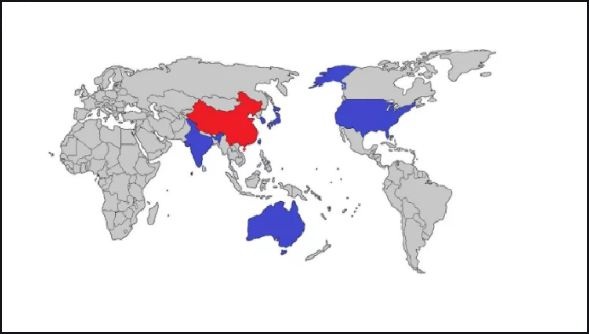On Friday, United States President Joe Biden will take part, virtually, in the first-ever meeting of leaders of the so-called “Indo-Pacific Quad” grouping, which includes the US, India, Japan and Australia. The group is often regarded as a counterweight to China’s growing assertiveness in Asia.
However, the White House has indicated that traditional security concerns might take a back seat at the meeting.
“We anticipate the meeting discussing a range of the crises we are facing as a global community from Covid, to climate, economic cooperation,” said White House spokeswoman Jen Psaki.
Also Read: Indo-US relations-Part-III-the Quadrilateral security dialogue
The informal partnership has long grappled with conflicting priorities, and different strategic and economic ties to China, but has been viewed by some as a bulwark against Beijing’s economic and military assertiveness in the region.
The four countries first worked collectively in 2004, in response to the devastation of an earthquake and tsunami in the Indian Ocean. In 2007, the countries aligned to tout a vision of a free and open Indo-Pacific, but were largely inactive amid pressure from China.
In recent years, the quartet has again increased cooperation, bolstered by a support campaign from the administration of President Donald Trump, which saw the Quad, short for Quadrilateral Security Dialogue, as the regional cornerstone of its confrontational approach to Beijing.
That increased cooperation came as bilateral relations between most of the Quad countries and China have taken a “fairly tense turn”, as said by Benoit Hardy Chartrand, an East Asia analyst at Temple University in Tokyo.
Quad foreign ministers have met regularly in recent years and all four countries conducted a massive joint military drill in the Indian Ocean in November last year.
Hardy-Chartrand further added, “The fact that the quad meeting now is going to be at the leader level is certainly an illustration of the seriousness with which, and the importance that, all four partners give to this partnership.”
Sentiment among the Quad countries towards China has cooled during the last decade as Beijing has rapidly modernized its defence forces and increased its military presence in the disputed waters of the South China Sea and the East China Sea.
Clashes between Indian and Chinese troops along the disputed Himalayan frontier and Chinese trade sanctions against Australia have further soured ties.
China’s crackdowns on the Uighur Muslim minority in the far western province of Xinjiang and on pro-democracy protesters in Hong Kong, and China’s growing sphere of economic influence, with an increasing number of countries relying on Chinese development and technology, have further undermined Chinese relations with the Quad countries.
Also Read: Australian Strategic Policy Institute finds out about detention camps in China
While the Quad countries have stressed that China is not their main motivator, “there has definitely been a greater willingness to cooperate on all parts, driven, in large part, by their problems with their relationship with China,” Hardy-Chartrand said.
The initiative will mean that vaccines developed in the United States will be manufactured in India and it will be financed by Japan and US. It will be supported by Australia. The vaccine initiative will allow new manufacturing capacity to be added in India for exports to the Indo-Pacific region. It is aimed at countering China in the region. This will not impinge on India’s existing manufacturing capacities.
This pooling of individual capacities and strengths by Quad countries is aimed at expediting global vaccine delivery. It will help meet the demand-supply gap, focusing on the Indo-Pacific region. It will add momentum to ongoing efforts to contain the pandemic.
The leaders in the Quad-meeting are expected to announce new financing agreements to support an increase in manufacturing capacity for vaccines in India, a senior US administration official told Reuters. The financing agreements will focus on companies and institutions in India manufacturing vaccines for American drugmakers Novavax and Johnson & Johnson. The aim would be to reduce manufacturing backlogs, speed up vaccinations and defeat the coronavirus mutations.
(With inputs from Reuters, Al-Jazeera & BBC)





